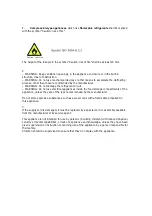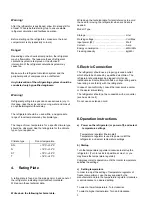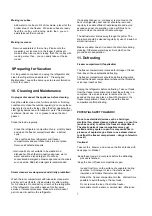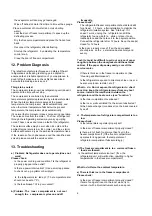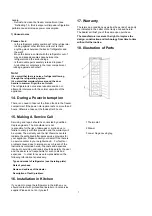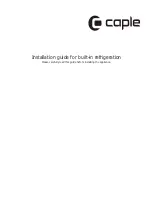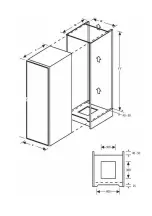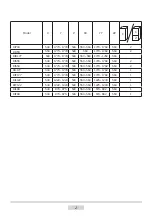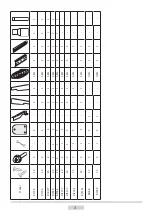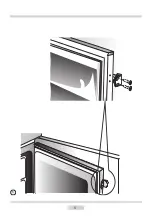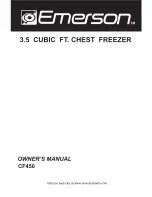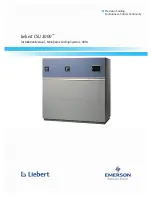
the evaporator surface may get damaged.
· Wipe off defrost
ed
water from time to time with
a
sponge.
· Place a co
n
tainer of hot
w
ater (do n
o
t use boilin
g
water)
near the door of freezer compartment to speed up the
defrosting process.
· Dry the freezer compartment and place the frozen food
back.
· Reconnect the refrigerator after defrosting.
· Start up the refrigerator by adjusti
n
g the temperature
control knob.
· Close the door of freezer compartment.
12. Problem Diagnosis
The latest manufacture tec
h
niques a nd state-of-the-art
refrigeration
a
nd freez
i
ng techn
o
logy ar
e
ado
p
ted to
ensure safe a
n
d rel
i
able o
p
eration of your appl iance. In
doubt of
f
ault, make sure to check first
a
s describe
d
below before making a service call:
Things to be noted:
The compressor (also known as refrigerating unit) doesn’t
operate all the time without stop.
The compressor is contr
o
lled b
y
th
e
automatic
temperature regulator represented by a tem
p
erature dial.
When the i
n
terior temper
a
ture e
x
ceeds the preset
temperature, the compr
e
ssor starts automaticall
y
and
when the inte
r
ior temperatu
r
e falls belo
w t
he present
temperature, the compressor stops automatically.
It’s normal that compressor makes noise during operation.
The noise com
e
s from the motor. The flow of refrigerant
through the re
f
rigerating s
y
stem ma
y
mak
y
a gur
g
ling
noise. These noises don’t mean a fault of the refrigerator.
The exterior surface ma
y
b
e
wet when it’s cold and the
ambient tempe rature is l
o
w. It’s normal and the e xterior
surface will become dry as the ambient temperature rises.
If the reasons of such phenomena can’t be identifi ed and
solved, please consult the service center.
13. Troubleshooting
a) Problem: Refrigerator does not ope rate (does not
work)
Please check:
· Is the power cord in good conditi on? Is the refrigerat or
properly plugged in the outlet?
· Is there a po
w
er int erruption? (Us e a small ap pliance
to check out, e.g. agitator or hair dryer)
· Is the refrigerator star ted up? (T he te mperature dial
should not be set at “0”.)
· Is the fuse broken? Or in poor contact?
b) Proble
m
: The
inne
r
compartment is not c
o
ol
enough; the compressor cycles on and off
frequently;
Please check:
· The refriger ator/freezer co mpartment sho
u
ld stan
d
still
for at least
1
2 hours after i
n
stallation to
s
tabilize the
refrigerant circulatio
n
s
y
stem. See “Start-up”. If it
doesn’t work, unpl
u
g the refrigerator
a
nd tilt the
refrigerator to one si
d
e for a while or p
l
ace it on an
inclined plane and the
n
place it to the origin
a
l position.
Connect the refrigerator after
1
2 hours. Keep the door(s)
closed for 12 hours.
· Is the door
properl
y
cl
o
sed? If so, the door gask
e
t
should pr
e
ss on the external cab
i
net se
c
urely a
n
d
evenly.
Test: It should be difficult to pull out a piece of paper
caught up between the door gasket and the external
cabinet. If the paper slips away easily, consult the
service center.
· If there is thick ice in the freezer compartment. (See
“Cleaning and Maintenance”)
· Is the refrigerator e xposed to direct suns hine or near a
heat source (oven, radiator, etc.)?
What to do: Do n
o
t exp
o
se th
e
refrig
e
rator to d
i
rect
sunshine; keep th
e
refrig
e
rator awa
y
f
r
om an
y
h
e
at
source; in
s
tall a th
e
rmal b
a
rrier
n
etween th
e
refrigerator and the heat source (see “Location”).
· Is the inner compartment overloaded?
· Is the room well ventilated? Is the air vent obstructed?
Is the heat exchanger (condenser) on the back covered
by dust?
c) The temperature of refrigerator compartment is too
low
Please check:
· Is the temperature regulator properly set?
· Is the door of freezer compartment properly closed?
· Is there a
l
ot of fresh
f
ood (more than
1
kg) in the
freezer comp
a
rtment? (If the freezer c
o
mpartment
operates for long peri
o
ds, the temperatur
e
of
refrigerator compartment falls accordingly.)
d) The fre
e
zer c
o
mpartment is too warm a
n
d froze
n
foods are thawed
· Is the ambient tem
p
erature too l
o
w? (If so, the
refrigerating u
n
it will m
a
lfunction, resulti
n
g in hi
g
her
temperatures in the freezer compartment.)
What to do: Raise the ambient temperature.
e) There is thick ice in the freezer compartment.
Please check:
· Is the door of freezer compartment properly closed?
· If some food gets frozen to the inner walls, try to
remove it with a blunt instrument such as a spoon
6



